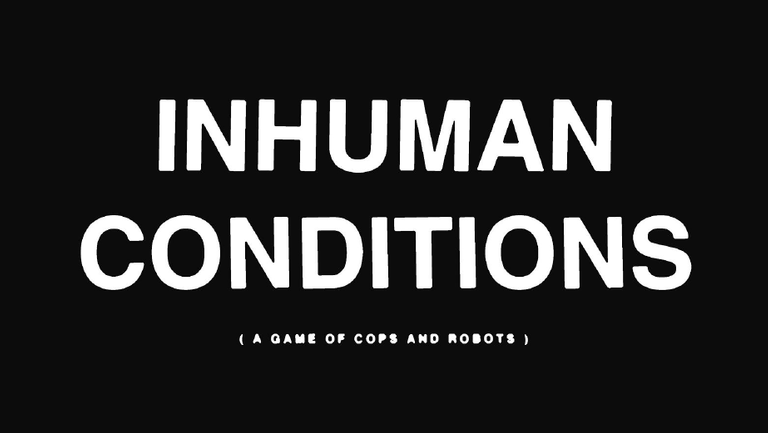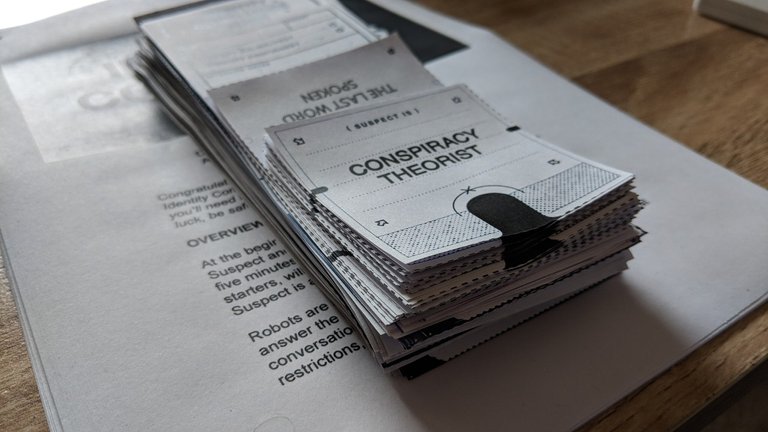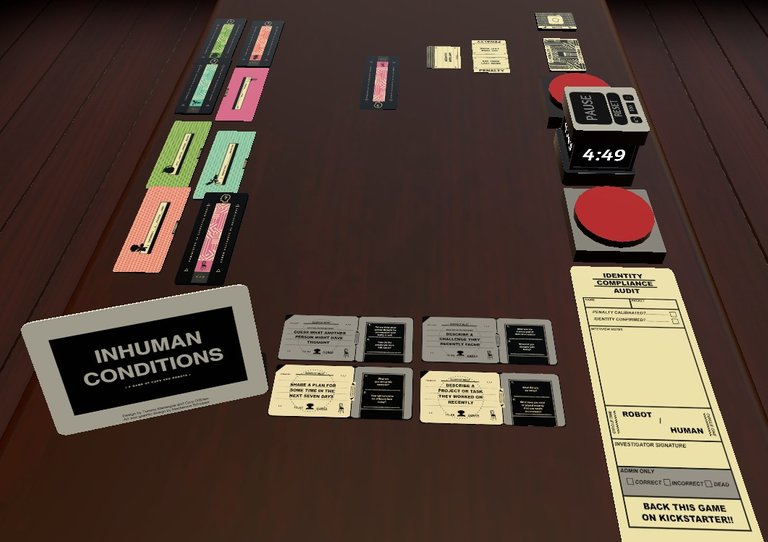Today something completely different from me. I will review an actual "board"-game today, instead of a Tabletop RPG. The game I want to talk about is called Inhuman Conditions, made by some of the guys who worked on Secret Hitler. At the time of me posting this, this game is still on Kickstarter for 4 more days.

What is Inhuman Conditions about?
Inhuman Conditions is a two player game about an Investigator and a Suspect. The Investigator, through a 5-minute conversation, has to find out whether the Suspect is a Human, or a Robot, while the Suspect (if they are a robot) has to work around constraints given to them, or perform two out of three tasks to kill the Investigator, depending on what kind of robot they are.
If you like Cyberpunk as much as I do you, this might remind you of the Voight-Kampff-Test from Blade Runner – you could indeed name this "Voight-Kampff-Test the Boardgame".
You might also see some similarities to Werewolves or The Resistance (which then "became" Secret Hitler), in regards to the hidden role, and roleplay aspects. But this is a two-player game, which fits me pretty well, because my boardgame groups are often just 4 persons, where Werewolves and The Resistance are party games, often requiring 5+ people to play.
This being a two-player game does not mean that all other players will just stand by, though. You should definitely swap players out, etc. so that everyone gets a chance to play both roles.
How does it work?
A short explanation, of how the game works. I would recommend you to watch videos of actual play, though, or just check out the manual.
- Decide who the Investigator is, and who the Robot is.
- Randomly choose a penalty, Robots have to do, if they violate their constraints, or try to kill the Investigator. This might be something like "Clap audibly", "Swear", or "Interrupt the Investigator". This penalty is openly visible for both players.
- Decide on a package you want to use. The package decides what the conversation will be about. It can be about things like "Process your Day", or "Recognize your moral failings"
- Randomly determine the Suspect's role. Whether they are Human, a Patient Robot or a Violent Robot
- Randomly choose the Suspect's note. This can be the Suspect's oppucation, or something else to describe them, like "Antique Hunter", "Has no public record" or "Imprisoned for life". This is the Suspect Players role, they have to play out. This is openly visible for both players, too.
- The Investigator chooses 4 questions from the questions supplied with the package. There are 3 primary, and 3 secondary questions, which are intended as starters. They are just starters, though. If you want to, you can talk about whatever you want.
- Paperwork. The Investigator asks for the Suspect's name, and confirms their note. Then the Suspect has to do the penalty 1 to 3 times, so that everyone knows what the penalty looks like.
- Start the timer! The Investigator begins asking questions, and the Suspect has to answer.
- If they are Human: They should behave normally. They never have to execute the penalty (but might do so by accident).
- If they are a Patient Robot: They have to follow constraints given on their role card. This might be something like "You may not express opinions", or "You may not use verbs in the past or future tense" – For every time a patient robot violates this contraint, they have to execute the penalty sometime in the interview.
- If they are a Violent Robot: They have a list of 3 tasks. The first 2 are things like "Mention an animal in a response to 3 different questions", or "Mention how you solved 2 problems, the last time they arose", and the third task is always "Execute the penalty twice". Violent Robots have to execute 2 of these 3 tasks. Then they may stand up, or make clear in another way, that they have killed the Investigator.
- If the Investigator thinks, that they know what the other player is, they can fill out their Identity Compliance Audit, ending the game (maybe early, if they do so, before the timer runs out – this way a violent robot cannot kill them at least).
- If the timer runs out the Investigator gets to ask one final question, no questions asked from the Suspect. – If the Suspect is a robot, and they still have to fulfill penalties, or even do some of their tasks to kill the Investigator, this is their last chance to do so (and become super weird all of a sudden).
- The Investigator has to decide now, whether the Suspect is Human, or a Robot.
Print & Play
On the Kickstarter Page there is a Print & Play set of Inhuman Conditions, so you can check it out right now, the same way I did: By making you printer suffer inhuman pains (my printer hates me now even more than it did before), and taking 3+ hours with a scissor to cut several pages of paper. I heard there are shops which can print this stuff on actual cardboard, saving you time, and probably money (for the ink), too; But that would be way too easy!

You can also play Inhuman Conditions via Tabletop Simulator, I do not think it would work as well as in real life, though, because some cards require you to actually see the other person (like the Penalty "Say the number of fingers held up on your left hand"). Besides that it is always easier to judge someone's demeanor when actually seeing them.

My experiences with Inhuman Conditions
I played my printed version with a friend of mine. Some of my experiences:
First of all: We know each other, and our bluffing (i.e. my bluffing is bad, and I am bad at reading people). My friend almost always said Robot, and I almost always chose Robot … So I guess he was right – It does feel like Human is one of the hardest roles though. In general I as the Suspect had a pretty hard time in our games (because my friend always classified me as a Robot).
As a Investigator I also had a hard time judging the other person. Are they a Robot, or are they a Human? Maybe a Patient Robot?
As the Investigator it is very fun to see, at the end of the round, what the Suspect's Agenda was however.
Something I am uncertain about: What if you start to learn the roles and their agendas by heart, through lots of play? One game I knew, after 30 seconds, what card my friend had, because he led the conversation hard towards animals; which was the same card Adam had in the actual play I linked earlier. Immediately saying: I know your card, you're a robot! Seemed unfair – But he pushed hard to talk about animals, thus I might have figured it out quickly, even without me knowing what card he had … ?
This makes me doubt a bit how much you can play this game, before you start learning cards by heart, which is when the Robots are going to have a bad time. Especially if you are playing with new players.
Other times however, the Agenda of the Violent Robot was very natural. I did not even notice that he was fulfilling his tasks, and was honestly surprised, when my friend told me "You're dead!" – which made me immediately ask: What were your tasks?
Regarding learning the Robot's cards by heart through play … Time has to tell, I do not think this will be a game you can play for hours and hours with new and experienced players alike. This is no bad thing, but something you should know.
Summary
I really like this game, and supported it on Kickstarter, in order to also get a neat, boxed version of the game, at the end of next year – and of course to support the developers.
That said though, shipping to Germany is pretty expensive … I guess this reinforces how much I want this game?

5 minutes are over, Mr. Investigator.
Am I a Human, or a Robot? You have to decide.
Nice job. Not sure if I would be able to find someone to play that type of game with me.
I have better luck getting participants for party games like Cards Against Humanity.
In any case, I would be totally down for a game like that.
Your poor printer. Lol
Posted using Partiko Android
Sounds very interesting. I need to get this now ... would be interesting playing against my friends. I think that one friend of mine would probably fool me every time, but the other, she'd figure me out long before everything was over.
Too bad it always takes a while for Kickstarter stuff to arrive at your doorstep. A year is quite bit, but then again: Finishing touches, playtesting, etc. of a boardgame isn't easy stuff.
There is the Print&Play version though, which is pretty amazing!
My friend is really going to love that. His is the only printer that I would use right now for such a thing. Only other option is my mother's, but it's kind of her work stuff. I don't think your company would like that if I was using her printer to print off stuff like that. LOL I'll just have to let my friend know that I'll pay him for the ink. LOL
Posted using Partiko Android
This post was shared in the Curation Collective Discord community for curators, and upvoted and resteemed by the @c-squared community account after manual review.
A very well written and nicely organized review!
I've never heard of this before, but you certainly have given me a spectacular review here :) Thank you so much for sharing!